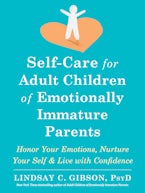By Lindsay C. Gibson, PsyD, author of Self-Care for Adult Children of Emotionally Immature Parents
Forgiveness is often framed as an important step in healing, so we don’t poison our own lives with anger toward our perpetrators. Popular wisdom advises us that revenge feelings keep us chained to past hurts, and we would be better off releasing those feelings through forgiveness. In other words, forgiveness is supposed to facilitate “moving on.” But with adult children of emotionally immature parents (ACEIPs), this message often does more harm than good, adding unfair guilt to an already emotionally fraught situation.
Some clients in psychotherapy worry when they are unable to forgive. Others assert they will never forgive the person who hurt them, no matter how sorry he or she was. Whatever their position, these clients believe that forgiveness should be considered. Yet they struggle with it. They have heard that a good person forgives, but they cannot. Here are some messages to give these clients:
- If you are an ACEIP facing the forgiveness dilemma, ask yourself why you feel it’s so important to try to forgive. Then, ask yourself why you think you haven’t been able to. This will take you back to the unfinished business you are still bitter about. The self-pressure to forgive might be showing that you doubt your right to claim your deepest, most painful feelings. In fact, forgiveness is often too much to ask of anyone, and it’s more healing to process your feelings than to try to get past them.
- All of us need permission to have our feelings as long as necessary, maybe forever. Forgiveness is not our ultimate goal. Untimely efforts at forgiveness short-circuit our natural emotional reactions and become counterproductive. If you feel guilty about not being able to forgive, it may be part of a tendency to invalidate your feelings by always putting other people first. This is a classic dynamic for ACEIPs. It seems to them that they should be pushing themselves to get over what happened to them. But our job in recovery is to remain solidly on the side of validating our pain and helping ourselves work through the shock of it.
- It is also helpful to ask ourselves if our perpetrator has asked for forgiveness. Many times, hurtful people don’t even acknowledge the seriousness of what they did. Genuine forgiveness comes easier when the other person apologizes and is clearly pained by their mistake. When that happens, our natural empathy and altruism has a chance to arise. But when other people minimize their behavior and urge us to move on and get over it, real forgiveness is nearly impossible. It’s more natural to forgive when one person deeply regrets what he or she did. It’s also easier to forgive when other people promise to self-monitor, so you no longer have to be on guard around them. (When someone asks you to let them know whenever they hurt you again, the burden is on you—not them—to enforce a change of awareness.)

- Rather than letting forgiveness become an obsessive preoccupation (should I or not?)see it for the kind of psychological red herring it is. The point is not whether you can forgive, but whether you have completed the processing of your trauma and emotional injuries. If the hurtful person is still in your life, you may need to steer your way forward with caution. The forgiveness part may take care of itself if the other person shows how sorry he or she is.
- Sometimes forgiveness spontaneously arises later when our perspective on life widens. For instance, you might become a stressed parent yourself with life challenges that undermine your empathy for your own children. Or you may learn information about the perpetrator that shifts your viewpoint. But like any other kind of trauma, we recover best when we can experience meaningful growth from what we went through. When your injuries are less raw—after deep trauma processing—you can ask yourself the following questions:
- Has the experience strengthened or matured me in any way?
- Has going through this made my own values stronger or clearer?
- Did how I was treated make me more empathetic to other people?
- One day, even without forgiveness, you might discover you have truly grown from these ordeals. But if you are not ready, you may resent these questions or feel that you are trying to force a premature positivity. The timing has to be right to consider such questions—only after you have worked through your anger enough to focus on your own development. By appreciating your growth, your future is no longer bound by old roles and fantasies. Instead of obsessing over forgiveness, let’s take the measure of what you have lost and gained, and thereby see the way forward for your future relationships.
Lindsay C. Gibson, PsyD, is a clinical psychologist in private practice who specializes in individual psychotherapy with adult children of emotionally immature (EI) parents. She is author of Adult Children of Emotionally Immature Parents, Recovering from Emotionally Immature Parents, and Who You Were Meant to Be, and writes a monthly column on well-being for Tidewater Women magazine. In the past, she has served as adjunct assistant professor of graduate psychology at the College of William and Mary, as well as at Old Dominion University. Gibson lives and practices in Virginia Beach, VA.



 Part 2: What to Do When a Client Is Participating in Self-Judgment?
Part 2: What to Do When a Client Is Participating in Self-Judgment?